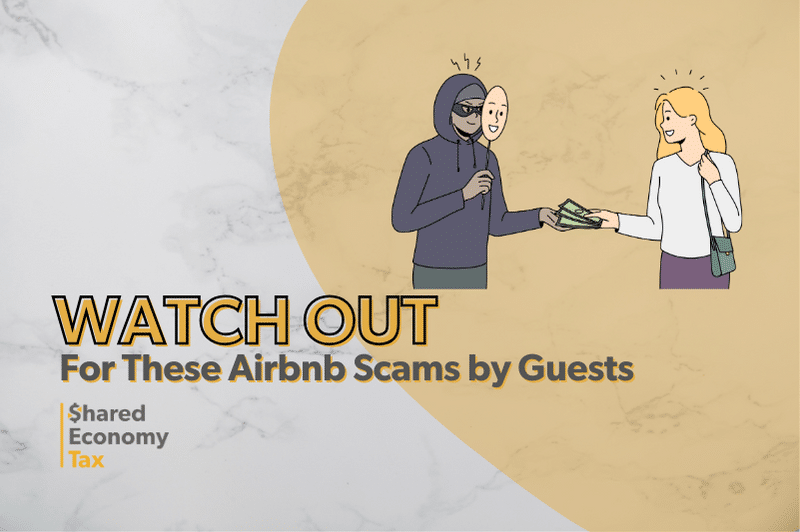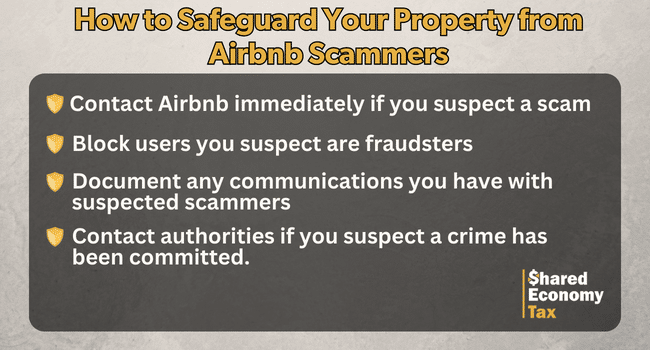
In the realm of short-term rentals, Airbnb hosts must be vigilant about scams. We put together this helpful guide to Airbnb scams by guests to equip you with the knowledge and strategies you need to protect yourself from the most common scammer tactics.
Introduction to Airbnb Scams
Being an Airbnb host comes with numerous advantages, the primary of which is that you can use your property to gain income.
However, Airbnb scams can happen to anyone. Most commonly, guests provide false or misleading information about their identity or their intentions. However, some scams can be much, much worse.
For example, they might not leave your property when their stay is over. Some states provide expansive legal protection for tenants that can make evicting these squatters an absolute nightmare.
There’s virtually no limit to the amount of damage a scammer can inflict on you and your business. Oftentimes, it’s already too late once you realize you’re being scammed, so the best defense is spotting scammers in advance.
Protecting yourself against scams takes vigilance and dedication. Scammers are constantly evolving, so the first step towards building an adequate defense against them is familiarizing yourself with their tactics.
What are the Most Common Airbnb Scammer Tactics?
Airbnb scams by guests come in many forms, but many of the most common focus around shortchanging you. Sometimes, they might lie to avoid additional fees. Other times, they might skip out on the bill entirely.
Some of the most common scams involve misleading hosts about who will stay in their property. In some instances, perpetrators want to avoid extra guest fees, while in more serious cases they may try to bring unapproved individuals into the property.
One common scammer tactic is claiming an extra guest at the last minute to circumvent certain Airbnb safeguards. Additional guests in your home may lead to damage or additional wear and tear.
In addition, unsanctioned guest don’t undergo Airbnb’s vetting process, so they could have criminal records or a history of abusing Airbnb properties.
Airbnb has many safeguards in place to protect guests, so many scammers will immediately attempt to steer the conversation to outside channels. Once they get you off the platform, the scamming and confidence games begin.
By agreeing to accept payment outside of Airbnb, you forfeit many of the protections the platform provides, so, always remember, a deal that sounds too good to be true probably is just that.
Last-Minute Cancellations and Disputes
Some shady guests will attempt to make last-minute cancellations by claiming a health emergency or other excuse. However, many claims are illegitimate, and you’re left stuck filling an unplanned vacancy.
For this reason, don’t issue refunds lightly, no matter how touching the sob story. Always demand documentation to support their claims, and be sure to include a large cancellation fee on your property so you can recoup some of your loss if a guest tries to leave you high and dry.
In other cases, guests sometimes use the credit card companies to do their dirty work. They’ll stay in your property, check out, pay, and then dispute the charge claiming they never made the transaction. If the credit card company accepts their claim, they’ll charge back for the balance.
Protecting against this scam requires documentation and evidence. Installing security cameras, documenting license plates on vehicles, and maintaining copies of your guest credentials will create evidence you can use to make your case to the credit card company in case one of your guests tries to pull a fast one.
Finally, one of the most costly and damaging scam risks comes from guests who don’t leave when their stay is over. This can be especially disastrous in states with extensive legal protections for tenants.
If you live in a state with difficult eviction laws, some veteran hosts recommend limiting rental terms to less than 30 days. In many states, renters that stay for more than 30 days gain protection as long-term tenants under state law, protecting them against evictions and other measures.
Some other commonly-encountrered Airbnb scams include:
- Overpaying and requesting a refund via a third-party app
- Refusing payment for damages
- Creating an Airbnb account with stolen information
- Asking for a refund by threatening you with a poor review
What Are the Most Common Red Flags?
To avoid being scammed by a guest, you must know how to identify some of the more typical red flags that indicate a possible scam. For example, be wary of guests who are making their first booking. Scammers often make fake accounts when booking rental properties.
Even if a guest makes an appeal to emotion, you should avoid accepting payments outside the Airbnb platform. These requests are often scams. The same is true when the guest asks for your personal contact details before they’ve even made a booking.
If a guest makes any unusual request for your phone number, social media account, or email address, there’s a good chance that they’re trying to get in touch with you outside the Airbnb platform, which you should avoid.w
How to Protect Your Wallet
As an Airbnb host, there are several financial precautions you can take to protect your wallet. It’s crucial that you adhere strictly to Airbnb’s payment and communication guidelines.
Whenever you speak with a guest or accept a payment, it needs to happen through Airbnb. The risk of being scammed is considerably higher when you venture off the platform.
Before accepting a booking, it’s highly recommended that you screen the guest, which can be done with one of the many guest-screening software solutions on the market.
This software will perform a comprehensive vetting process to verify the guest’s information and identify possible risks. You’ll also receive alerts of any suspicious bookings.
If one of your guests asks for a refund because of an overpayment, don’t approve it immediately. This request is often a scam, which is why you should ask for proof via a screenshot of their latest bank statement.

How to Safeguard Your Property
Airbnb scams by guests don’t just target you directly. Sometimes, they victimize you by misusing and damaging property. The repair bills you receive afterward can amount to a lot of money, which may lead to the guest refusing to pay what they owe.
Fortunately, there are several steps you can take to protect your property and avoid these hassles.
For example, consider asking for security deposits, which you get to keep if the guest causes damage. You should also use surveillance cameras if they are in compliance with local laws and Airbnb guidelines. Make sure you opt for a thorough check-in/check-out process to keep the guest accountable for any damage they cause.
Dealing with Suspected Scams
If you suspect that a guest is attempting to scam you, make sure you contact Airbnb.
Select the “report” button, which gives you the opportunity to mention suspicious behavior. Give in-depth details of the problem to ensure Airbnb can conduct a thorough investigation.
You can also block users who you believe are fraudulent. Go to their profile and click on the “block” button. If Airbnb agrees with your assessment, they may suspend or remove the user in question.
Document any communications you have with the guest. If you think that a law has been broken, contact law enforcement immediately. When a guest is hostile, leave the premises and dial 911 right away.
Staying Vigilant as a Host
In the future, it’s a good idea to remain prudent and vigilant as a host. You can keep yourself from falling victim to scams by:
- Verifying guest profiles
- Maintaining good communication through the Airbnb platform
- Setting clear and comprehensive house rules
- Maintaining strict cancellation policies
- Knowing Airbnb terms of service and policies
Closing Thoughts on Airbnb Scams By Guests
When you serve as an Airbnb host, you must always be vigilant against guest scams. Never go outside the platform to complete a transaction or speak with the guest. You need to set clear policies and rules for your guests to follow.
When anything suspicious occurs, report it to Airbnb immediately. To protect your finances and properties, it’s essential that you remain informed, cautious, and proactive.
Airbnb hosting is hard enough with scammers running around. Don’t let your taxes be a nightmare too! Shared Economy Tax is the leading tax firm specializing in Airbnb taxes. Get started now for a one-on-one strategy session with one of our veteran tax pros.